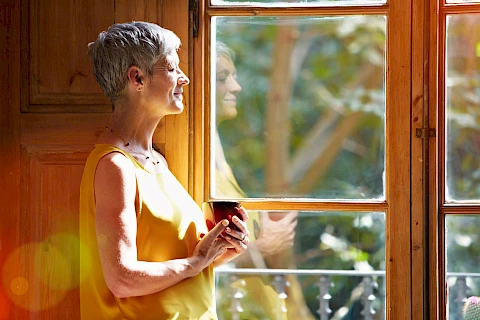
An essential aspect of maintaining good health as we age is ensuring optimal bone health. One nutrient that plays a significant role in this regard is vitamin D. Often referred to as the "sunshine vitamin," vitamin D is instrumental in maintaining strong and healthy bones. This Senior Helpers blog post explores the importance of vitamin D in promoting calcium absorption and maintaining bone density in seniors and how it aids in preventing debilitating conditions like osteoporosis and fractures.
Vitamin D and Bone Health
Vitamin D is a fat-soluble vitamin that our body primarily obtains from sunlight exposure, food consumption, and supplements. Its primary function is to help the body absorb calcium and phosphorus from our diet. These minerals are essential for the development and maintenance of healthy, robust bones. Without adequate Vitamin D, our bodies cannot absorb sufficient calcium. This leads to softer, thinner, and brittle bones known as osteomalacia in adults and rickets in children.
Role of Vitamin D in Preventing Osteoporosis and Fractures
Osteoporosis is a bone disease characterized by decreased bone density. It leads to increased bone fragility and a higher risk of fractures. This condition is particularly common among seniors. Research suggests a strong relationship between low vitamin D levels and osteoporosis. When the body has enough vitamin D, it effectively absorbs dietary calcium. This contributes to the maintenance of good bone density and reduces the risk of osteoporosis and fractures.
Vitamin D Sources
Getting the most beneficial amount of vitamin D your body needs can be achieved in several ways. Here are a few to consider:
Sunlight
Sunlight exposure is the most natural way to get vitamin D. Amount needed depends on several factors, including the time of day, where you live, and your skin type. Experts generally recommend 10-30 minutes of sun exposure at least twice a week. Seniors, however, are wise to protect their skin with good broad-spectrum sunscreen, choose less sun-intense times of the day, and wear long-sleeved shirts when out in the sun to avoid any harmful effects.
Diet
What you eat can also play a significant role in vitamin D intake. Fatty fish, including salmon, mackerel, and tuna, are rich natural food sources of Vitamin D. They also have the bonus of providing heart-healthy Omega-3 fatty acids to your diet. Breakfast foods like fortified dairy products, cereals, orange juice, and egg yolks can also help you obtain what you need. Incorporating these foods into your daily diet helps boost your vitamin D levels.
Supplements
If your diet and sun exposure fall short, vitamin D supplements can help ensure that you get enough of the nutrients. Taking vitamin D supplements is considered generally safe when taken in the correct dosages. It is essential to consult with your healthcare providers before starting any supplement regimen. They are in the best position to know if supplements might interact with other medicines you are taking and what dosage will work most effectively for your circumstances.
Senior Helpers Prioritizes Bone Health
Senior Helpers provides a wide array of in-home, senior care services customized to the specific needs of our community's seniors. If you live in the Kernersville, Greensboro, Reidsville, or Guilford County areas, contact us today at Senior Helpers Winston Salem Greensboro. Our team of dedicated professionals is committed to providing outstanding senior care services, including nutrition and wellness advice that prioritizes your bone health.